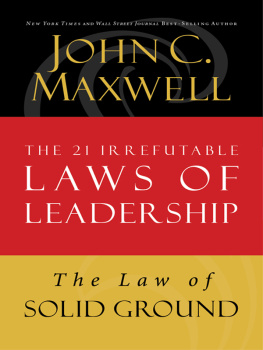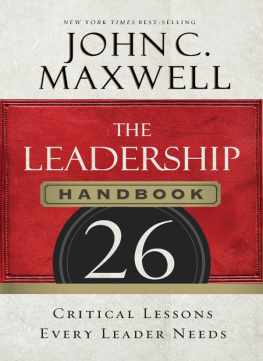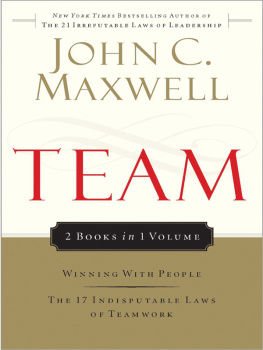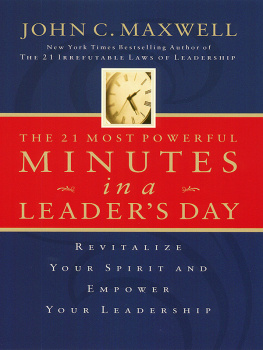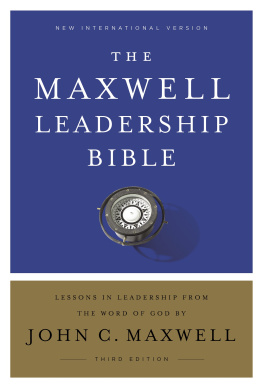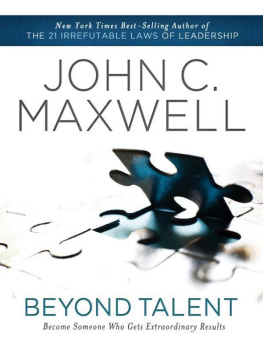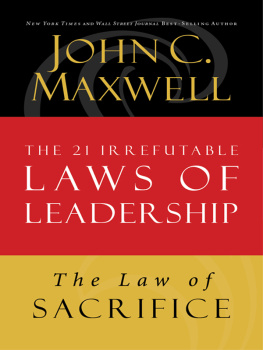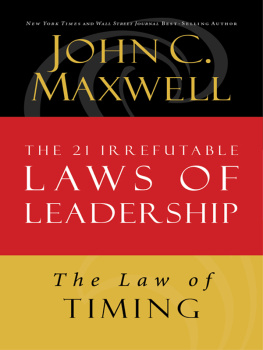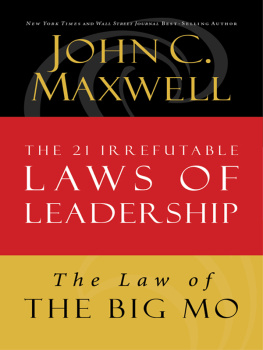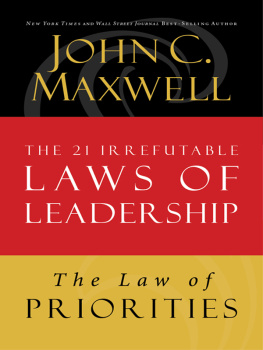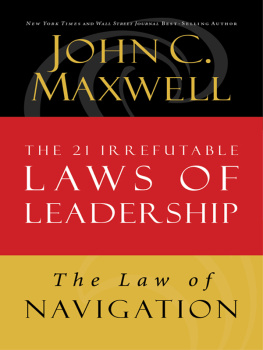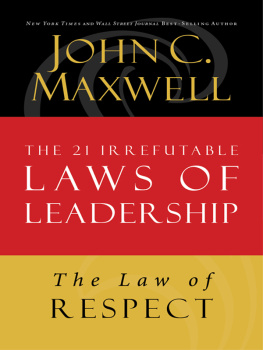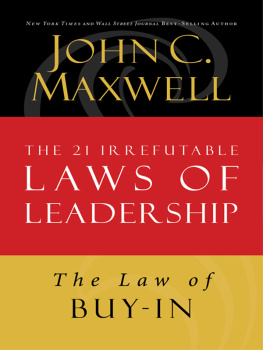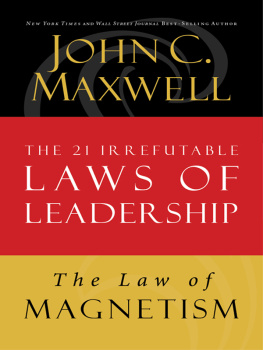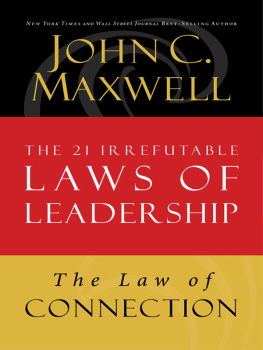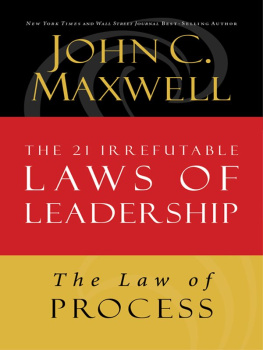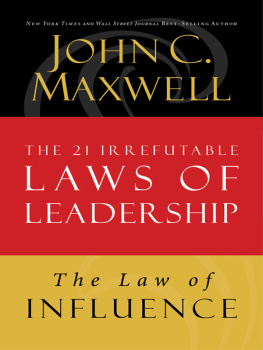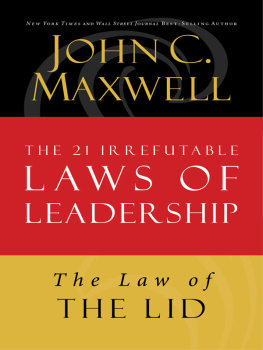
1998 and 2007 by John C. Maxwell
This ebook is derived from The 21 Irrefutable Laws of Leadership, by John Maxwell, 1998 and 2007 by Maxwell Motivation, Inc., a Georgia corporation.
All rights reserved. No portion of this book may be reproduced, stored in a retrieval system, or transmitted in any form or by any meanselectronic, mechanical, photocopy, recording, scanning, or otherexcept for brief quotations in critical reviews or articles, without the prior written permission of the publisher.
Published in Nashville, Tennessee, by Thomas Nelson. Thomas Nelson is a trademark of Thomas Nelson, Inc.
Thomas Nelson, Inc. titles may be purchased in bulk for educational, business, fund-raising, or sales promotional use. For information, please e-mail SpecialMarkets@ThomasNelson.com.
Published in association with Yates & Yates, LLP, Attorneys and Counselors, Orange, California.
Scripture quotations noted CEV are from THE CONTEMPORARY ENGLISH VERSION.
1991 by the American Bible Society. Used by permission.
Scripture quotations noted The Message are from The Message: The New Testament in Contemporary English. 1993 by Eugene H. Peterson.
ISBN 978-0-7852-7431-5 (HC)
ISBN 978-1-4185-3831-6 (ebook)
ISBN 978-1-4002-7565-6 (ebook of Chapter 6)

This book is dedicated to Charlie Wetzel, my writing partner since 1994. Together weve written more than forty books, and Ive enjoyed our collaboration on every one. As I have labored to add value to others by identifying and teaching leadership principles, Charlie, you have added value to me and my efforts. Your insights and skills as a wordsmith have been enjoyed by millions of readers. As a result, you have made a greater impact on more people than has anyone else in my inner circle. For that I thank you.
CONTENTS


Thank you to the thousands of leaders around the world who learned and sometimes challenged the laws of leadership, thus sharpening my thinking.
Thank you to the team at Thomas Nelson who gave me the chance to revise and improve this book, and especially to Tami Heim for her strategic leadership and to Victor Oliver who was instrumental in the development of the original concept.
Thank you to Linda Eggers, my executive assistant, and her assistant, Sue Caldwell, for their incredible service and willingness to go the extra mile every day.
Thank you to Charlie Wetzel, my writer, and Stephanie, his wife, with-out whose work this book would not have been possible.

Trust Is the Foundation of Leadership
How important is trust for a leader? It is the most important thing. Trust is the foundation of leadership. It is the glue that holds an organization together. Leaders cannot repeatedly break trust with people and continue to influence them. It just doesnt happen.
As a nation, we have seen our trust in leaders go up and down during the last several decades. Watergate certainly took its toll on the American peoples confidence in leadership. Trust in President Richard Nixon became so low that he had no choice but to resign; he had lost his ability to influence. Bill Clinton was a remarkably gifted leader, but questions of trust undermined his leadership. The corporate scandals of the 1990s shook peoples confidence in business leadership. Reports of sexual harassment at the military academies undermined confidence in leadership in the armed services. And the incidents of abuse in the Catholic Church disillusioned many people with its leadership. Leaders cannot lose trust and continue to influence others. Trust is the foundation of leadership. Thats the Law of Solid Ground.
IT WASNT THE DECISIONSIT WAS THE LEADERSHIP
I personally learned the power of the Law of Solid Ground when I was the senior pastor of Skyline Church in the San Diego area. In the fall of 1989, we had several new programs starting at the church, preparations for our exhausting Christmas show season were in full swing, and I was traveling quite a bit as a speaker. It was very hectic. Because I was so busy, I let my choleric nature get the better of me and made a big mistake. I very quickly made three major decisions and implemented them: I changed some components of the Christmas show, I permanently discontinued our Sunday evening service, and I fired a staff member.
Whats interesting is that none of my three decisions was wrong. The change in the Christmas program was beneficial. The Sunday evening service, though enjoyed by a few of the older members of the congregation, wasnt serving a need that wasnt already being met better elsewhere. And the staff member I fired had to go, and it was important that I not delay in dismissing him. My mistake was the way I made those three decisions. In an organization made up of many volunteers, decisions need to be processed correctly.
Because everything in the church was going so well, I thought I could take a shortcut. I was wrong. Ordinarily, I would gather my leaders, cast vision for them, answer questions, and guide them through the issues. Then I would give them time to exert their influence with the next level of leaders in the church. And finally, once the timing was right, I would make a general announcement to everyone, giving plenty of reassurance and encouraging people to be a part of the new vision. But I didnt do any of those things, and I should have known better.
THE RESULT WAS MISTRUST
It wasnt long before I began to sense unrest among the people and to hear rumblings. At first, my attitude was that everyone should get over it and move on. But then I realized that the problem wasnt them. It was me. I had been too impatient. On top of that, my attitude wasnt very positivenot good when youre the guy who writes books on attitude! Thats when I realized that I had broken the Law of Solid Ground. For the first time in my career, my people were questioning me. Our relationship of trust was beginning to erode.
As soon as I realized I was wrong, I publicly apologized to my people and asked for their forgiveness. Your people know when you make mistakes. The real question is whether youre going to fess up. If you do, you can often regain their trust. Fortunately, thats what happened with me. From then on, I was more careful to correctly process decisions. I learned firsthand that when it comes to leadership, you just cant take shortcuts, no matter how long youve been leading your people.
Trust is like change in a leaders pocket. Each time you make good leadership decisions, you earn more change. Each time you make poor decisions, you pay out some of your change to the people. All leaders have a certain amount of change in their pocket when they start in a new Leadership position. Whatever they do either builds up their change or depletes it. If leaders make one bad decision after another, they keep paying out change. Then one day, after making one last bad decision, they suddenlyand irreparablyrun out of change. It doesnt even matter if the last blunder was big or small. At that point its too late. When youre out of change, youre out as the leader.
Next page
